Thailand has long been a top destination for retirees worldwide looking for warm weather, affordable living, and a vibrant cultural experience. With its diverse regions, world-class healthcare, and strong & welcoming expat communities, Thailand offers an excellent quality of life.
In this guide, we’ll explore the best retirement locations, visa options, cost of living, healthcare, property laws, and more.
Before you commit to retirement in Thailand
Retirement here can be fantastic, but the smartest first step is checking whether your finances, healthcare plan, lifestyle expectations, and long-term stability are truly aligned with a move.
Where to Live? Picking the Most Suitable Destination
Thailand is a land of contrasts, offering everything from bustling city life to tranquil beach retreats. Choosing where to retire in Thailand is a game of trade-offs. So, where should you settle down?
Do you want city convenience or beachside serenity? A buzzing expat scene or a more authentic Thai experience? Thailand offers a variety of retirement destinations, each with its own appeal. Here’s a breakdown of the top spots:
Chiang Mai – The Cultural & Budget-Friendly Gem
Chiang Mai, the so-called Rose of the North, is situated in a mountainous region of northern Thailand, approximately 700 kilometers (435 miles) north of Bangkok. Retirees flock to Chiang Mai for its low cost of living, slower pace, and strong expat community.
The weather is cooler than in the south, and the city is packed with markets and temples and surrounded by lush green mountains. It’s ideal for retirees who appreciate a laid-back lifestyle, access to nature, and a rich history but still want modern amenities. The Old City is filled with temples and markets, while areas like Nimmanhaemin offer a modern, trendy vibe.
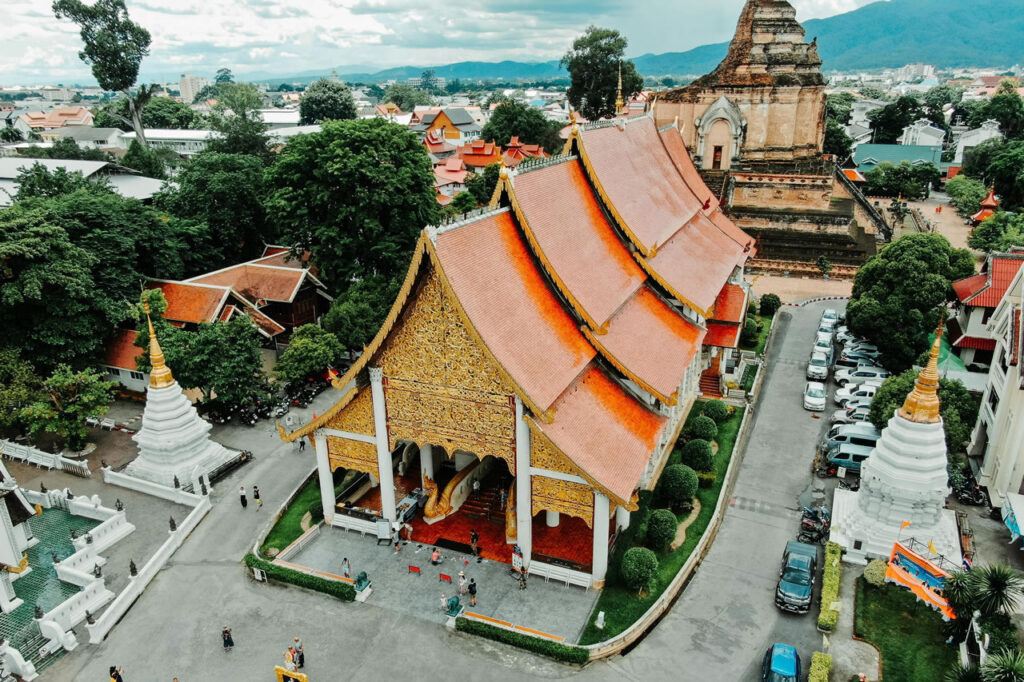
- Chiang Mai is incredibly budget-friendly when it comes to accommodation; monthly rent for comfortable housing starts as low as THB 10,000.
- Chiang Mai has a huge expat population, making it easy for foreigners to meet new friends, network, and find support. Whether you’re a retiree, digital nomad, teacher, or entrepreneur, there are plenty of expat events, meetups, and social groups to join.
- Chiang Mai has become a global hotspot for digital nomads, with co-working spaces and laptop-friendly cafés offering fast Wi-Fi, air conditioning, and great coffee.
- Chiang Mai has some of the best private hospitals in the country, offering high-quality health care at affordable prices.
- Chiang Mai is a food lover’s paradise, offering everything from cheap and tasty street food to high-end international cuisine.
- Chiang Mai has a broadly diversified nightlife and music scene, including pubs & bars, cocktail lounges, pool bars, live music, and nightclubs.
📌 The only drawback I can find is the sometimes extremely high air pollution during the so-called “Burning Season,” approximately from late February to mid-April.
Why Expats Live Here?
- Low cost of living
- Cooler weather than most of Thailand
- Vibrant café culture & co-working spaces
- Strong expat community & social scene
- Access to nature, hiking, and cultural sites
Who lives here?
- Digital nomads
- Retirees
- Creatives and entrepreneurs
Hua Hin – The Beach Town with a Sophisticated Touch
Originally a royal retreat, Hua Hin is a great choice for retirees who want seaside living without the chaos of tourist-heavy islands and rowdy nightlife of places like Pattaya. Just a few hours from Bangkok, Hua Hin has a slower pace of life, making it an excellent choice for those who want a coastal retreat with good infrastructure.
The cost of living is moderate, and the laid-back beach town is well known for its beautiful beaches, top-tier golf courses, international restaurants, shopping malls, and strong established retiree community.
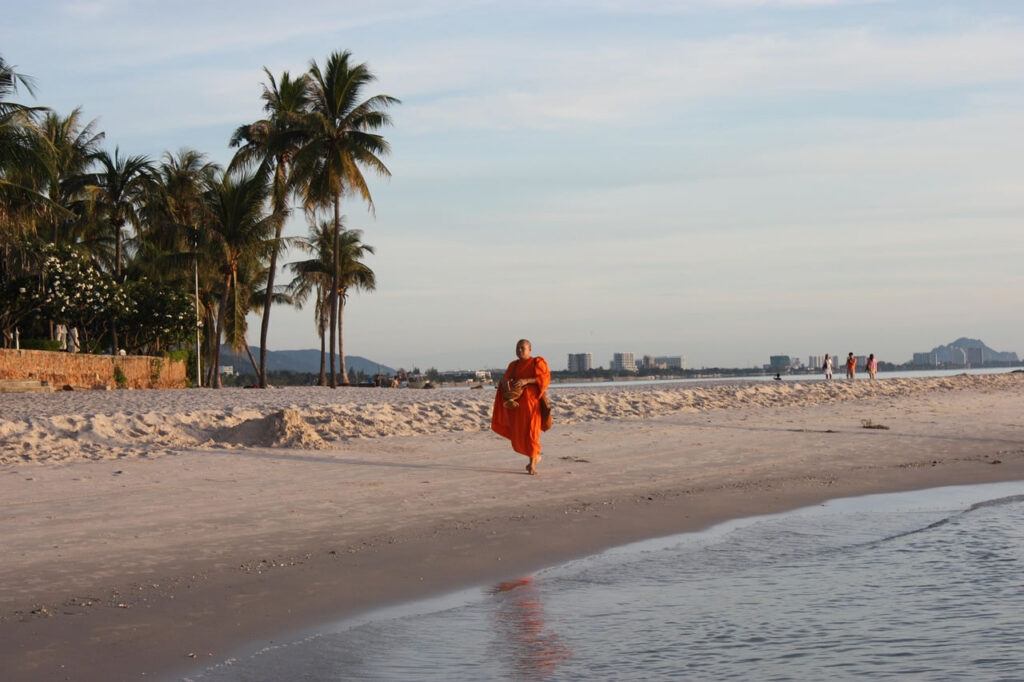
Why Expats Live Here?
- Laid-back lifestyle
- High-quality yet affordable healthcare
- Golf courses and outdoor activities
- Less humid than Phuket
- Close to Bangkok (2.5-hour drive)
Who lives here?
- Retirees
- Expats looking for a quieter life
Hua Hin is my personal favourite, and after traveling all over Thailand and living in Chiang Mai for 25 years, I have made Hua Hin my new home. For me, it provides the perfect package of a relaxed lifestyle by the beach and excellent value for money while offering all the amenities I want.
For the time being, this makes it an ideal choice at my current stage in life. But that’s just me, and your “perfect place” obviously depends on your personal preferences.
Read more about me and meet Stephan, the Founder of ThriveInThailand.com
Bangkok – The Urban Jungle with Modern Comforts
If you love and seek the exciting buzz of big city life, Bangkok offers endless entertainment, fine dining, and solid public transport. Retirees can enjoy top-tier healthcare, high-end shopping, and cultural landmarks.
Regarding accommodation, the capital city provides everything from luxury high-rise condos to traditional Thai neighborhoods. Downsides? Traffic and air pollution can be frustrating, plus it’s pricier than other regions. But for those who love city life, Bangkok is unbeatable!
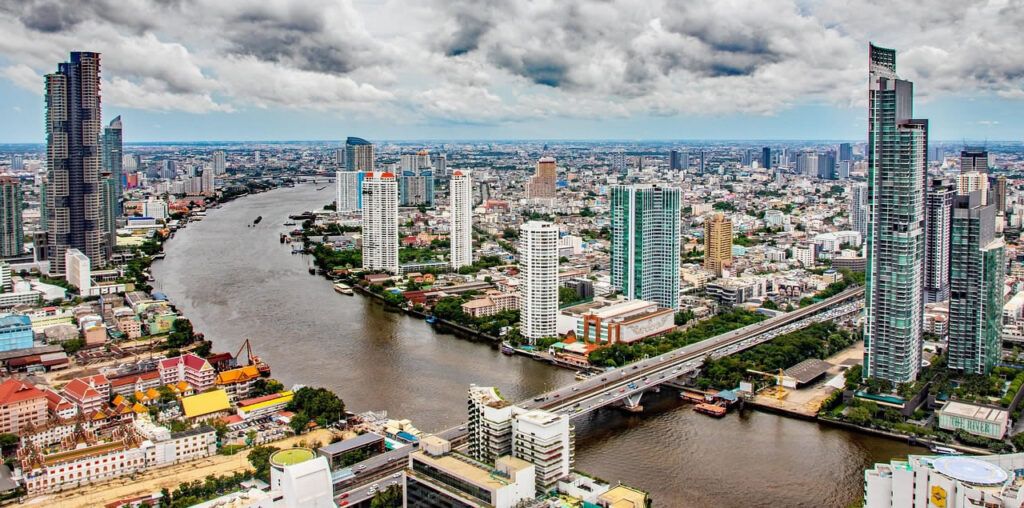
Why Expats Live Here?
- Thriving job market & business opportunities
- World-class healthcare
- Diverse nightlife, restaurants, and shopping
- Many international schools for expat families
- Well-connected transport (BTS, MRT, airport)
Who lives here?
- Business professionals
- Digital nomads
- Retirees who love city life
- English teachers and corporate workers
Phuket – The Luxury Island Life
If waking up to an ocean view sounds like paradise, Phuket is for you! Phuket offers luxury island living with high-end amenities and an international airport.
Retirees here can enjoy world-class beaches, a strong expat community, and excellent healthcare facilities. The downside? It’s pricier than other areas, but for retirees with a bigger budget, it’s a slice of paradise.
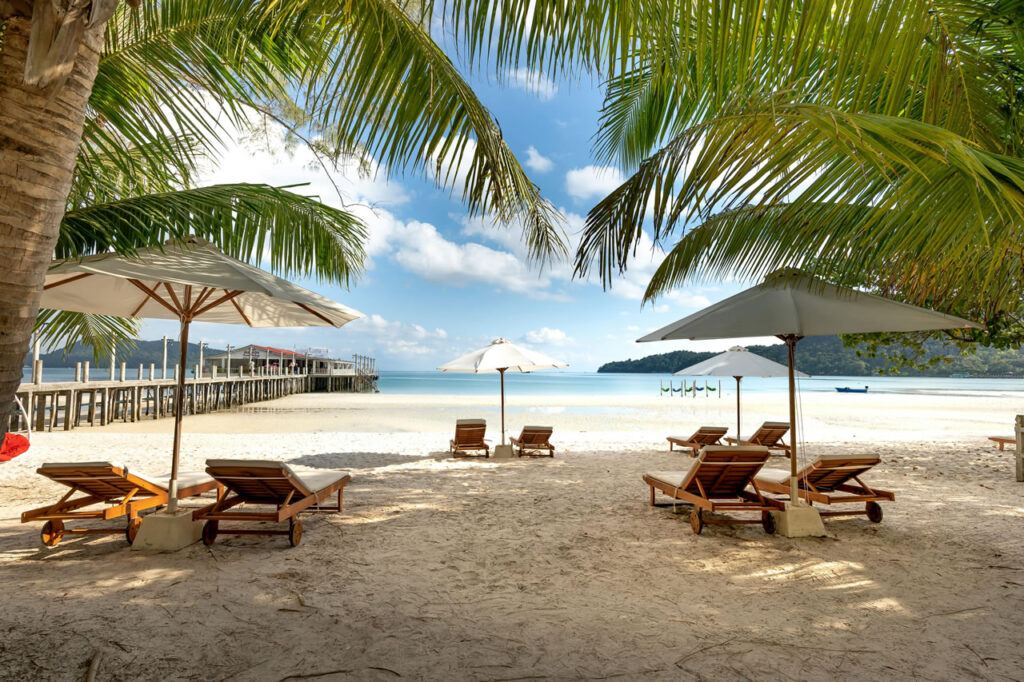
Why Expats Live Here?
- Stunning beaches and island lifestyle
- High-end living with luxury villas and resorts
- Large international expat community
- Great international hospitals
- Airport with flights to many countries
Who lives here?
- Wealthy retirees
- Entrepreneurs in tourism & hospitality
- Digital nomads who love the beach
Pattaya – The Lively Coastal City with a Buzz
Pattaya often gets a bad rap for its nightlife, but it’s also home to some of the best retirement-friendly infrastructure. There are quiet residential areas offering affordable housing, international hospitals, and plenty of entertainment options.
The city is particularly appealing to retirees who want beachside living, an active social life, and easy access to Bangkok.
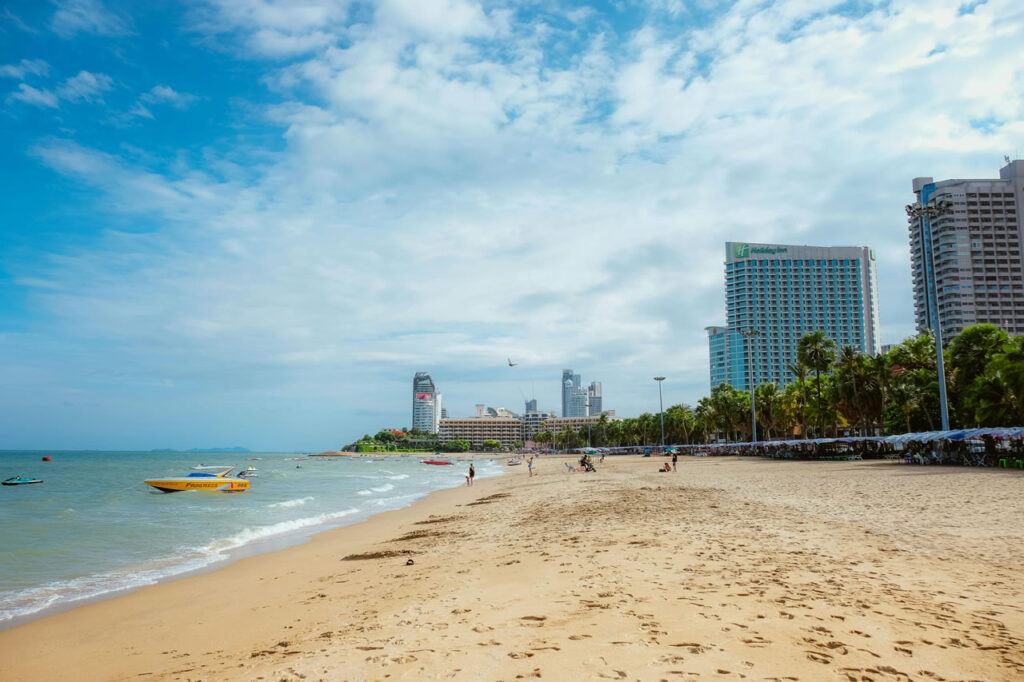
Why Expats Live Here?
- Affordable condos with sea views
- International hospitals and amenities
- Active nightlife and entertainment scene
- Large retiree community
- Close to Bangkok (1.5-hour drive)
Who lives here?
- Retirees
- English teachers
- Business owners in hospitality and tourism
📌 For practical travel advice and must-see highlights, see my detailed Pattaya Travel Guide.
Koh Samui – The Tropical Island Dream
Koh Samui is a tropical paradise that blends natural beauty with modern comforts, making it a top choice for retirees and expats (who can afford it) seeking island life with solid infrastructure.
Unlike more remote Thai islands, Samui offers a good balance – stunning beaches, lush jungles, and a relaxed island vibe, alongside international hospitals, shopping centers, and well-developed roads.
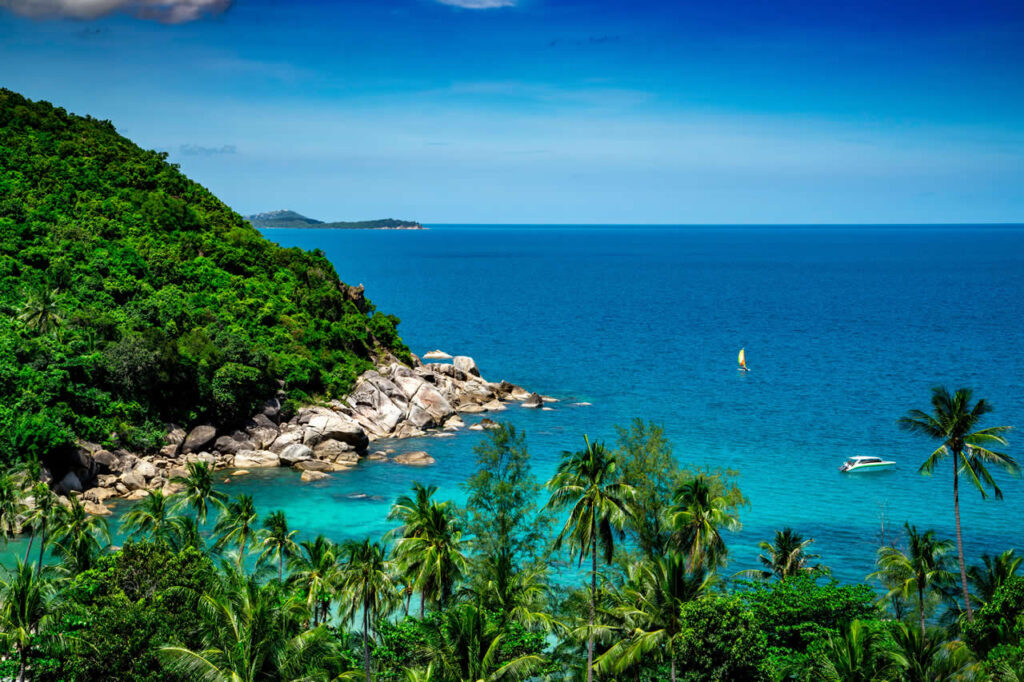
With its vibrant expat community, excellent dining scene, and easy access to Bangkok via its own airport, Koh Samui is an attractive choice for those seeking a scenic yet comfortable island lifestyle. The cost of living varies, with both budget-friendly and luxury options available.
Having said this, an island is obviously always more expensive than the mainland because so many things have to be brought there either by boat or by plane which automatically raises the cost of living. Also, getting off the island can be expensive (by plane) or time consuming (by boat).
The downside? Koh Samui is a fully developed international travel destination with tourism being the single most important part of the island’s economy. The exotic island receives over 2 Million visitors per year which not only creates revenue but also some real problems such as a huge solid waste volume, sewage trouble and erosion issues.
Why Expats Live Here?
- Beautiful beaches and lush greenery
- Growing expat scene
- More peaceful than Phuket
- Luxury villas & wellness retreats
Who lives here?
- Wealthy retirees
- Remote workers and entrepreneurs
➡️ Popular retirement hubs like Chiang Mai, Hua Hin, and Phuket each offer something unique—whether it’s mountain air, beach life, or a slower pace. Check out my full guide to the best places to live in Thailand to see how they compare.
Udon Thani – The Underrated Gem
An affordable, slower-paced city in the Isaan region with a growing expat scene. Udon Thani offers a lower cost of living compared to the major tourist destinations, and it is well-connected to Laos and other parts of Thailand. The city is great for those who enjoy local culture and a quiet lifestyle.

Photo by Stefan Fussan on Wikimedia Commons, licensed under CC BY-SA 3.0
Why Expats Live Here?
- Low Cost of Living
- Good Infrastructure
- Strong Expat Community
- Relaxed Lifestyle
- Growing Development
Who lives here?
- Retirees
- Long-term expats looking for an affordable lifestyle
Chiang Rai – The Tranquil Mountain Retreat
Chiang Rai is kind of a smaller version of Chiang Mai but still offers good infrastructure, including modern hospitals, shopping centers, and Western restaurants, while maintaining a relaxed, small-town feel at a lower cost. Surrounded by the mountains of northern
Thailand, it boasts a cooler climate, rich cultural heritage, and stunning natural scenery. Known for its iconic temples, coffee culture, and access to outdoor activities, Chiang Rai is a good alternative for retirees and expats who prefer a quieter, closer-to-nature lifestyle away from the hustle of Thailand’s bigger cities, such as Bangkok or Chiang Mai.
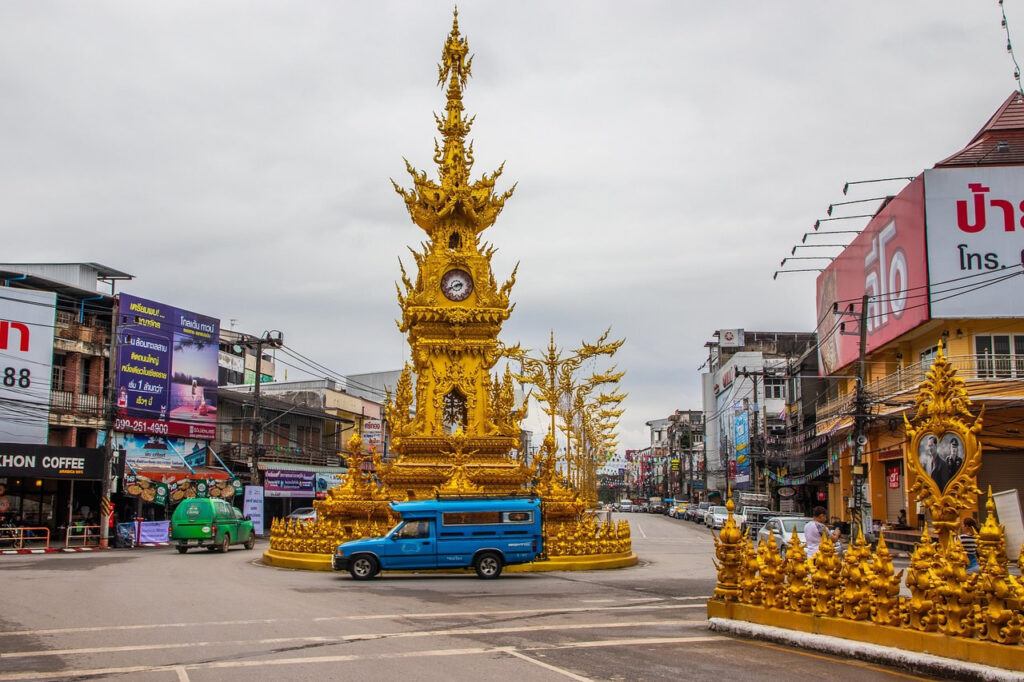
Why Expats Live Here?
- Even lower cost of living than Chiang Mai
- Cool weather and peaceful lifestyle
- Stunning mountain scenery
Who lives here?
- Retirees
- Nature lovers and cultural enthusiasts
📌 Planning a visit? Check out my detailed Chiang Rai Travel Guide for practical info and tips on what to do, where to stay, and how to get there.
Krabi – The Scenic Outdoor Adventure Haven
Krabi is a great choice for retirees and expats seeking a coastal lifestyle with beautiful natural scenery and a relaxed atmosphere. Known for its dramatic limestone cliffs, clear waters, and beautiful beaches, Krabi offers a quieter alternative to Phuket while still having good infrastructure, including hospitals, shopping centers, and international restaurants.
The cost of living is moderate, with options ranging from budget-friendly to high-end resorts. While tourism is a major part of the local economy, many areas remain peaceful, making Krabi ideal for those who want a scenic, laid-back life without being too isolated.
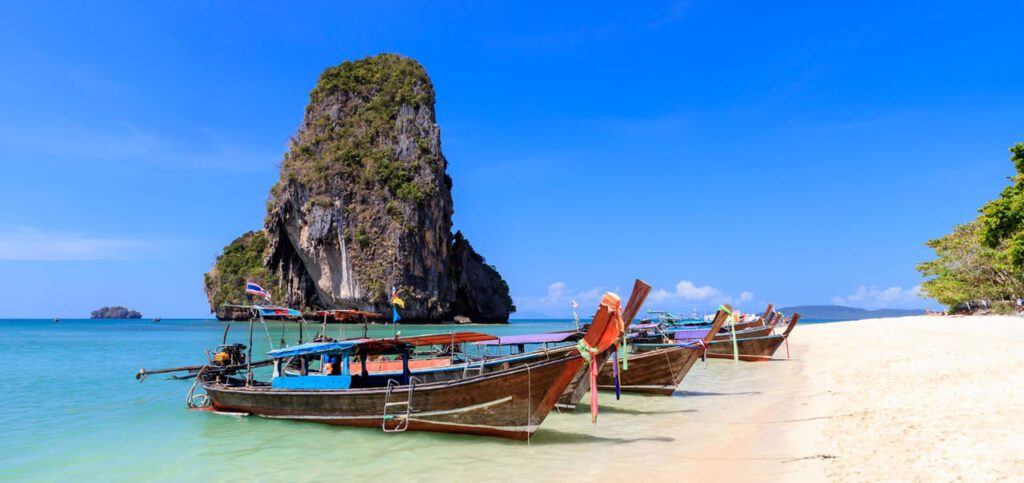
Why Expats Live Here?
- Breathtaking landscapes with cliffs and beaches
- More relaxed than Phuket
- Growing expat community
- Easy access to islands like Koh Lanta
Who lives here?
- Retirees
- Outdoor and adventure lovers
📌 Want a closer look at life in the area? My full Krabi Travel Guide covers beaches, neighborhoods, island access, and what day-to-day living actually feels like.
Korat (Nakhon Ratchasima) – The Gateway to Isaan
Nakhon Ratchasima, or Korat, is a top choice for retirees and expats looking for an affordable, authentic Thai city with modern conveniences. As the gateway to Thailand’s northeast (Isaan), Korat offers a lower cost of living than Bangkok while still having good infrastructure, including hospitals, shopping malls, and international schools.
The city has a growing expat community and a more local feel, with less tourism than coastal destinations. Known for its rich history, nearby national parks, and strong Thai culture, Korat is ideal for those who prefer a laid-back, budget-friendly lifestyle in a well-connected, developing city.

Photo by Promphong on Wikimedia Commons, licensed under CC BY-SA 3.0
Why Expats Live Here?
- Affordable living with modern amenities
- Less touristy, more authentic Thai experience
- Great infrastructure and hospitals
- Close to Bangkok via train or highway
Who lives here?
- Retirees
- Long-term expats looking for a mix of city and rural life
Where Do Most Expats Live Overall?
- Bangkok (business, expats of all kinds)
- Chiang Mai (digital nomads, retirees)
- Pattaya & Phuket (retirees, business owners)
- Hua Hin (retirees)
Thailand offers a wide variety of retirement destinations depending on what you’re looking for – whether it’s an urban lifestyle, a cultural retreat, or beachfront relaxation. When selecting a retirement location, consider lifestyle, cost of living, access to healthcare, and the size of the expat community.
Each destination has its own unique charm, so before choosing a place as your new home visiting first is absolutely mandatory to help making an informed decision you won’t regret.
📌 Still deciding where to retire? Explore 35 of Thailand’s top destinations in my guide to the Best Places to Visit in Thailand. It includes must-see highlights and an interactive map to help you plan your scouting trip.
Visa Options for Retirees – Staying Legally in Thailand
To retire in Thailand long-term, foreigners typically need a Non-Immigrant O or O-A Visa:
Retirement Visa (Non-Immigrant O-A Visa)
Available for individuals aged 50+, this is the most common visa. Requirements include a minimum bank balance of THB 800,000 or a monthly income of THB 65,000. This visa allows retirees to stay for one year with annual renewal options. It also requires a police clearance certificate and a medical certificate in some cases.
📌 Read my complete guide ===> Thailand Retirement Visa
Thailand Privilege Visa – The Hassle-Free Choice
A long-term visa is available for those willing to pay a premium. If you prefer to skip visa headaches, Thailand offers the Thailand Privilege Visa, formerly known as the Elite Visa with VIP benefits. It’s a long-term visa (5-20 years) but comes with a hefty price tag, starting at THB 600,000 for a 5-year membership. The visa provides a hassle-free stay with concierge services, airport fast-track privileges, and multiple entry options. No 90-day reporting.
📌 Get the extensive guide ===> Thailand Privilege Visa – Long-Term Residency in Thailand
Marriage Visa (Non-Immigrant O)
If you’re an expat married to a Thai citizen, you can apply for a Non-Immigrant O Visa based on marriage. This visa is renewable annually and has a lower financial requirement compared to the retirement visa but also allows long-term residency.
📌 Check out the complete guide ===> Thailand Marriage Visa
Thailand Guardian Visa
If you’re planning to stay in Thailand to care for your child while they attend school, the Thailand Guardian Visa could be the right option. It allows foreign parents or legal guardians to live in the country legally, as long as the child is enrolled in a recognized Thai or international school.
📌 Check out the full overview ===> Thailand Guardian Visa
Thailand Permanent Residency
For retirees looking to settle in Thailand permanently, Thai Permanent Residency offers a long-term alternative to annual visa renewals. Once approved, you can stay in the country indefinitely without the hassle of reapplying each year. It also makes daily life easier — from registering your address and buying a condo to applying for a work permit if needed.
📌 Read the complete roadmap ===> Thailand Permanent Residency
Cost of Living – What to Expect?
Thailand offers a relatively affordable lifestyle, but your retirement budget will ultimately depend on your personal preferences, spending habits, and the city or region you choose to settle in.
While everyday expenses like food and transportation can be inexpensive, costs can rise significantly if you prefer a more Westernized lifestyle, frequent travel, or premium healthcare. Here’s a general breakdown of what you can expect at different budget levels:
Budget Lifestyle (THB 30,000-50,000/month)
Ideal for those who prefer a simple and cost-effective way of living. This budget typically covers:
- A modest studio or one-bedroom condo (THB 5,000-15,000/month) in an affordable city like Chiang Mai, Udon Thani, or Khon Kaen.
- Eating mostly local Thai food from street vendors or small restaurants (THB 50-100 per meal).
- Relying on affordable public transport such as buses, motorbike taxis, and songthaews (shared taxis) instead of owning a car.
- Minimal travel within Thailand or internationally.
Mid-Range Lifestyle (THB 50,000-100,000/month)
A comfortable lifestyle with more conveniences and occasional indulgences, including:
- A well-furnished apartment or a small house (THB 15,000-30,000/month) in cities like Bangkok, Phuket, or Pattaya.
- Frequent dining out at mid-range restaurants, mixing local and Western food (THB 150-500 per meal).
- Some domestic and occasional international travel.
- A mix of public transport and occasional car rentals or ride-hailing services like Grab.
- Private healthcare coverage for better medical access and comfort.
Luxury Lifestyle (THB 100,000+/month)
For retirees who want a high standard of living with premium comforts:
- A spacious condo, luxury apartment, or even a private villa (THB 40,000-100,000+).
- Regular fine dining at international restaurants and access to imported groceries.
- Private healthcare at top-tier hospitals with VIP services.
- Car ownership with a driver or luxury vehicle.
- Frequent international travel and weekend getaways to resorts.

Major Expenses to Consider
Rent
Housing is often the biggest expense, and costs vary widely depending on location and property type:
- Budget options: THB 5,000-15,000/month for a small condo or studio in cities like Chiang Mai or Isaan provinces.
- Mid-range options: THB 15,000-50,000/month for a comfortable apartment or house in Bangkok, Phuket, or Pattaya.
- Luxury options: THB 50,000-150,000+/month for high-end condos, villas, or beachfront properties.
Food
Thailand offers an incredible variety of food at different price points:
- Street food and small local restaurants: THB 50-100 per meal.
- Mid-range restaurants (Thai and some Western options): THB 150-500 per meal.
- High-end dining and international cuisine: THB 1,000+ per meal.
- Grocery costs vary, with local markets offering fresh produce cheaply, while imported products can be significantly more expensive.
Healthcare
Thailand has excellent healthcare facilities, especially in Bangkok and other major cities.
- Public hospitals: Very affordable but often crowded.
- Private hospitals: World-class services at a fraction of Western prices.
- Health insurance: Private insurance starts at THB 30,000/year, but comprehensive coverage for retirees can be THB 50,000-150,000/year, depending on age and medical history.
Transportation
- Public transport (buses, trains, MRT, BTS, and songthaews): THB 10-50 per trip.
- Motorbike taxis and Grab rides: THB 50-200 for short to medium distances.
- Car rental: THB 15,000-30,000/month.
- Car ownership: New car prices are high, with added expenses like insurance, fuel, and maintenance.
Visa Renewals & Administrative Costs
Costs vary based on visa type:
- Retirement visa (Non-Immigrant O-A/O): THB 1,900 per extension, plus possible agent fees if using a service.
- Elite Visa: Starts at THB 600,000 for a 5-year visa.
- Other long-term visas: May require financial proof and renewal fees.
Thailand provides an excellent quality of life at a fraction of the cost compared to many Western countries. Whether you choose a frugal or luxurious lifestyle, careful budgeting and understanding local costs will help ensure a comfortable and enjoyable retirement.
➡️ Here you can find detailed information about: Cost of Living in Thailand – A Complete Guide for Expats
Healthcare & Medical Insurance – World-Class Care at a Fraction of the Cost
One of the biggest advantages of retiring in Thailand is access to high-quality healthcare at a fraction of Western costs. Whether you need routine check-ups, specialized treatments, or emergency care, Thailand’s hospitals—especially its private facilities—are known for their modern infrastructure, highly trained medical staff, and affordability.
Many hospitals in Thailand cater specifically to international patients, offering English-speaking doctors, VIP services, and shorter wait times compared to Western healthcare systems.
Top Hospitals for Retirees
Thailand is home to several internationally accredited hospitals, particularly in major cities like Bangkok, Chiang Mai, Phuket, and Pattaya. Some of the top choices for retirees include:
- Bumrungrad International Hospital (Bangkok) – Often ranked among the best hospitals in Asia, Bumrungrad is a favorite among expats and medical tourists. It features cutting-edge technology, English-speaking staff, and a reputation for top-tier treatments, including cardiology, orthopedics, and preventive health screenings.
- Samitivej Hospital (Bangkok) – Another popular choice for expats, Samitivej offers excellent care with a strong focus on international patients. The hospital has multiple locations, including Samitivej Sukhumvit, which is known for its expat-friendly services and specialists in geriatrics, oncology, and physical therapy.
- Bangkok Hospital (Nationwide) – With branches in major cities like Pattaya, Phuket, Chiang Mai, and Hua Hin, Bangkok Hospital provides premium healthcare across Thailand. It offers specialized services in cardiology, neurology, and orthopedics, making it an excellent option for retirees needing regular medical care.
Public vs. Private Healthcare
Thailand has both public and private healthcare systems, and choosing between them depends on your budget, expectations, and healthcare needs.
Public Hospitals
- Affordable, with treatment costs significantly lower than private hospitals.
- High-quality medical professionals, but longer wait times and overcrowding are common.
- Limited English-speaking staff, which can be a challenge for expats.
- Best for basic treatments and emergencies if you’re on a tight budget.
Private Hospitals
- World-class facilities with international accreditation.
- Shorter wait times, VIP services, and English-speaking doctors.
- Higher costs compared to public hospitals, but still much cheaper than in Western countries.
- Best for expats and retirees who prefer high-quality care and comfort.
Whether required for your visa or simply to access Thailand’s top-tier hospitals, having a solid plan gives you peace of mind and better service. Explore trusted providers, pricing tips, and visa-compliant coverage in my full Thailand Health Insurance Guide.
Long Term Care Options: Assisted Living, Nursing Homes, Home Care
Thailand has become a popular destination for active retirees looking for an affordable and comfortable lifestyle to enjoy their golden years. But what happens when independent living is no longer an option and you need help with daily tasks or even full-time care?
That’s not a scenario we necessarily want to think about too much and hopefully won’t have to face in the future. But it’s always better to be informed if you are planning ahead or prepared if suddenly facing immediate care needs.
Thailand offers a range of several long-term care solutions tailored to foreigners in need of help at the later stages of life. At a fraction of Western costs, in the Land of Smiles, you can choose from assisted living, full-time nursing homes, and individual home care to suit your needs and budget.
➡️ What happens if independent living is no longer an option? Here is a full guide about: Long Term Care Options for Foreigners in Thailand
Health Insurance – Why It’s Essential
While Thailand’s medical costs are lower than in Western countries, having private health insurance is highly recommended—especially for retirees. Without insurance, a major medical emergency or chronic condition could lead to high out-of-pocket expenses.
Insurance Costs:
- Basic coverage: THB 30,000–50,000 per year (covers general hospital visits, minor procedures).
- Comprehensive plans: THB 50,000–100,000+ per year (covers hospitalizations, specialist treatments, surgeries, and some pre-existing conditions).
Popular Health Insurance Providers for Expats:
- Pacific Cross – Well-known for expat-friendly health insurance with a range of coverage options.
- Aetna Thailand – Offers flexible plans tailored for retirees and long-term residents.
- Luma Health – Provides premium healthcare plans with excellent international coverage.
Thailand offers top-tier healthcare at a fraction of the price you’d pay in Western countries, making it an ideal destination for retirees looking for both affordability and quality.
Whether you opt for public or private care, having health insurance ensures you receive the best possible treatment without worrying about unexpected medical costs.
It’s also wise to think ahead – setting up a proper will in Thailand can help protect your assets and ensure your wishes are respected.
➡️ Not sure if Thailand is the right fit for your golden years? This honest guide lays out the real-life ups and downs of expat life in Thailand ===> The Pros and Cons of Living in Thailand as an Expat
Buying or Renting Property in Thailand?
One of the most common questions for retirees moving to Thailand is whether to buy or rent property. While Thailand has attractive real estate options, foreign ownership laws are restrictive, making renting the preferred choice for most expats. However, if you’re set on purchasing, there are legal ways to invest in property.
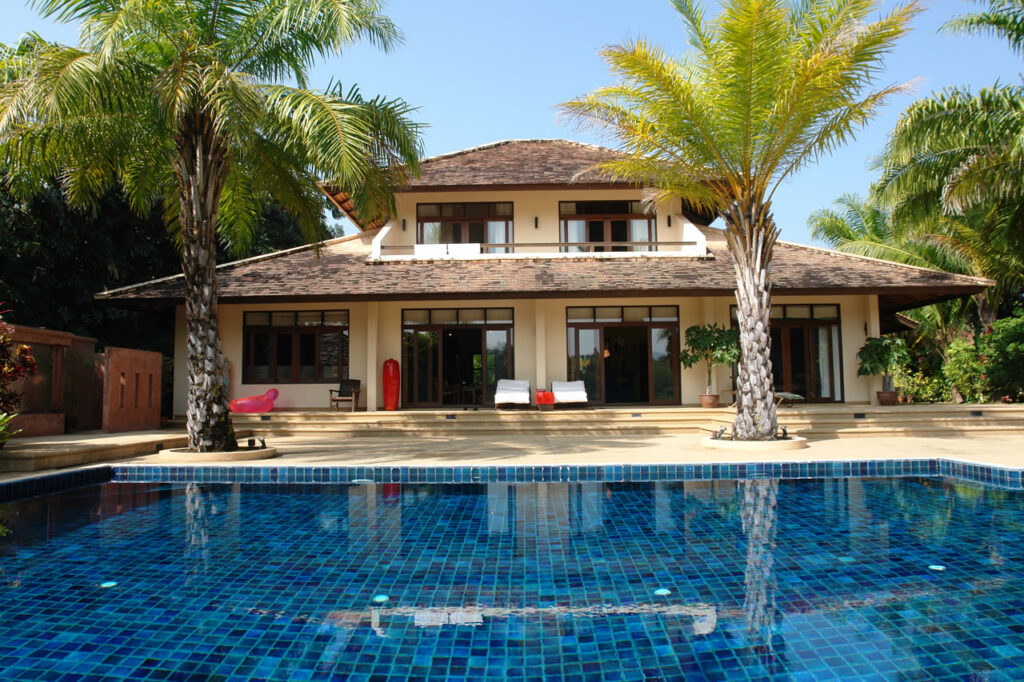
Can Foreigners Buy Property in Thailand?
Foreigners cannot directly own land in Thailand, but they can own certain types of property under specific conditions. Here are the main ways to legally acquire real estate:
Buying a Condo – The most straightforward option for foreigners. Thai law allows foreigners to own up to 49% of the total units in a condominium building, with the remaining 51% reserved for Thai nationals.
- Pros: Full legal ownership, easy to resell, no need for a Thai partner.
- Cons: Limited to condos; no direct land ownership.
Leasing Land – Foreigners can lease land for up to 30 years, with the option to renew. Some retirees lease land and build a house on it, though this does not grant ownership of the land itself.
- Pros: A legal way to secure a long-term home.
- Cons: Lease renewal isn’t always guaranteed; ownership remains with the landowner.
Setting Up a Thai Company – Some foreigners choose to establish a Thai limited company where the business owns the land. However, the company must be majority Thai-owned (at least 51%), making this a complex and closely monitored option.
- Pros: Allows indirect land ownership.
- Cons: Strict legal scrutiny; requires a legitimate business setup, not just a shell company.
Investing in a Long-Term Lease or “Usufruct” – Some legal mechanisms, such as usufruct agreements, allow a foreigner to live on a property for their lifetime without ownership. This can be useful for long-term security but does not offer true ownership.
➡️ Planning to settle down permanently? Our detailed guide to buying property in Thailand as a foreigner covers everything retirees need to know about legal options and long-term security.
Why Most Retirees Choose to Rent
For most retirees, renting is the best option as it provides flexibility, lower upfront costs, and fewer legal risks.
Affordability & Variety – Rental prices vary widely depending on location and property type. In cities like Chiang Mai, a comfortable condo can cost THB 10,000-20,000/month, while in Bangkok, a high-end apartment might be THB 30,000-100,000/month.
No Legal Hassles – Renting eliminates concerns about ownership restrictions, resale difficulties, or legal changes
Easy to Relocate – If you decide to move cities or return home, there’s no need to sell a property or deal with complicated legal processes.
Maintenance-Free – Most rental agreements include maintenance and repair services, meaning you won’t have to worry about home upkeep.
While owning a home in Thailand is possible under certain conditions, it comes with legal complexities. Renting is often the best choice for retirees who value flexibility, lower financial risk, and hassle-free living.
If you’re considering buying, it’s essential to consult a qualified real estate lawyer to ensure you fully understand Thai property laws before making any commitments.
➡️ For information regarding renting read my guide: How to Rent a Condo or House in Thailand: Everything Expats Need to Know
Social Life & Expat Communities in Thailand
One of the biggest perks of retiring in Thailand is the vibrant and welcoming expat community. Whether you prefer socializing with fellow expats or integrating into Thai culture, there are countless ways to build a fulfilling social life. From casual meetups to structured clubs and activities, making friends in Thailand is easy – as long as you’re open to new experiences.
Where to Meet Other Expats?
Thailand has large expat networks, especially in cities like Bangkok, Chiang Mai, Pattaya, Phuket, and Hua Hin. Here are some of the best ways to connect:
Meetup Groups & Social Networks
- Internations – A global expat network hosting events in major Thai cities. Great for professionals, retirees, and newcomers.
- Facebook Expat Groups – Local Facebook groups such as “Expats in Thailand,” “Bangkok Expats,” and “Chiang Mai Digital Nomads” help you find events, get advice, and make connections.
- Local Clubs & Associations – Many cities have chambers of commerce, social clubs, and networking events for retirees and business professionals.
Popular Expat-Friendly Hangouts
- Co-working spaces & cafes – Even for retirees, these can be great spots to meet like-minded individuals.
- Sports bars & international restaurants – Many expats frequent Western-style pubs or restaurants where socializing is easy.
- Beach clubs & resorts – In coastal areas like Phuket or Koh Samui, beachside bars often attract expats looking for a relaxed lifestyle.
➡️ Discover the best communities, social hubs, and insider tips for building a thriving social life. Click here to read more: Expat Communities and Social Life in Thailand
Activities for a Fulfilling Social Life
Staying active and engaged is key to enjoying retirement in Thailand. Many expats join hobby groups, sports teams, or volunteer organizations to meet people and maintain an active lifestyle.
Sports & Outdoor Activities
- Golf – Thailand has world-class golf courses, and expat golf groups are popular in Bangkok, Hua Hin, and Pattaya.
- Yoga & Meditation – Many retirees take up yoga or meditation, particularly in Chiang Mai, a hub for wellness retreats.
- Hiking & Adventure – Northern Thailand, particularly Chiang Mai and Pai, offers great trekking groups for outdoor lovers.
- Water Activities – Coastal expats enjoy diving, sailing, and paddleboarding, especially in Phuket, Koh Tao, and Krabi.
Social & Cultural Activities
- Volunteer Work – Many expats give back to the community by volunteering at local schools, animal shelters, or environmental groups.
- Cooking Classes – A fun way to learn Thai cuisine while socializing with locals and other foreigners.
- Language Exchange – Many Thais want to practice English in exchange for helping you learn Thai, making language meetups a great way to integrate.
Cultural Integration: Blending in with Thai Society
While it’s easy to stick to expat circles, embracing Thai culture can make your experience even more rewarding. Here’s how to connect with locals and feel more at home:
- Learn Basic Thai – Even just a few phrases like “Sawasdee krub/ka” (hello) or “Khop khun krub/ka” (thank you) go a long way in building connections.
- Make Local Friends – Many Thais are warm and welcoming, and friendships with locals can enrich your experience. Consider joining Thai social groups, attending local festivals, or participating in community events.
- Respect Thai Customs – Simple things like removing your shoes before entering a home, dressing modestly at temples, and greeting people with a ‘wai’ (the Thai greeting gesture) show respect and help you blend in.
Thailand offers a fantastic social environment for retirees, whether you prefer mingling with fellow expats or immersing yourself in the local culture. With plenty of activities, groups, and welcoming communities, it’s easy to stay active, make friends, and enjoy a rich and fulfilling retirement in the Land of Smiles.
Thai Language & Communication – Making Life Easier
While English is widely spoken in expat-friendly areas, such as Bangkok, Phuket, Chiang Mai, and Pattaya, learning basic Thai can significantly enhance your experience in Thailand. Whether you’re ordering food, asking for directions, or chatting with locals, a little effort in speaking Thai goes a long way in fostering better relationships and navigating daily life.
How Much Thai Do You Need to Know?
Survival Thai – If you plan to stay in major cities, learning a few key phrases will be enough for basic interactions. Many locals in tourist areas and hospitals speak English, but taxi drivers, street vendors, and smaller businesses may not.
Conversational Thai – If you want to integrate more into Thai society, making friends with locals or living in less touristy areas, learning basic conversation skills can be very helpful.
➡️ Read my article about how to tackle Language Barriers For Foreigners In Thailand including Essential Thai Phrases for Everyday Life.
While you can get by in Thailand with just English in major cities, learning even a little Thai shows respect for the culture and makes everyday life easier.
Whether you’re haggling at a market, chatting with a taxi driver, or making local friends, even basic Thai can open doors to richer experiences and deeper connections. Plus, Thais truly appreciate when foreigners make an effort – it often leads to friendlier interactions and even discounts!
Thai Culture & Adaptation – Embracing the Thai Way of Life
To truly enjoy retirement in Thailand, it’s essential to understand and embrace the local culture. While Thailand is welcoming and accommodating to foreigners, adapting to its customs, traditions, and social norms will help you integrate smoothly and avoid cultural misunderstandings.
Respect for Thai Customs
Thais value politeness, respect, and harmony, so understanding and practicing local etiquette can go a long way in building positive relationships.
➡️ Cultural adaptation in daily life is one of the most overlooked keys to a fulfilling retirement in Thailand — here’s how to do it right ===> Adapting to Thai Culture: How to Embrace Thai Culture as a Foreigner
Adjusting to the Slower Pace of Life
Thailand operates at a different rhythm than many Western countries. The Sabai Sabai mindset means that life here is often more laid-back and less time-sensitive.
Patience is Key – Whether you’re waiting for service at a restaurant, dealing with bureaucratic processes, or expecting a contractor to finish a job, things may take longer than expected. Adapting to a go-with-the-flow mentality will reduce frustration and help you enjoy life more.
Mai Pen Rai Mentality – The Thai phrase mai pen rai (ไม่เป็นไร) roughly translates to “never mind” or “no worries.” It reflects the national attitude of letting go of stress and focusing on the positives. Adopting this mindset will help you embrace the Thai way of life.
Buddhist Influence in Daily Life
Thailand is a predominantly Buddhist country, and its religious and spiritual beliefs play a big role in everyday life. Many retirees find peace, inspiration, and even personal growth by exploring Buddhism.
Adapting to Thai culture is one of the most rewarding aspects of retiring in Thailand. By respecting local customs, embracing the relaxed lifestyle, and appreciating the country’s Buddhist influences, retirees can integrate more smoothly and form deeper connections with locals.
While Thailand welcomes foreigners with open arms, a little cultural awareness goes a long way in making your experience more fulfilling and enjoyable.
Banking & Finances – Managing Money in Thailand
Managing your finances efficiently is key to a stress-free retirement in Thailand. While you can rely on international banking services for some transactions, opening a Thai bank account is highly recommended – not only for convenience but also for visa compliance and cost savings.
Why You Need a Thai Bank Account
A Thai bank account makes daily transactions smoother and avoids high foreign transaction fees. It’s especially useful for:
Visa & Retirement Requirements – Some long-term visas, like the Retirement Visa (O-A or O-X), require proof of funds in a Thai bank account.
Lower ATM & Conversion Fees – Foreign card withdrawals incur fees of THB 220 per transaction, plus possible currency conversion charges from your home bank. Using a local bank card eliminates these extra costs.
Utility & Rental Payments – Many landlords and utility providers preferlocal bank transfers over cash or foreign credit cards.
Online Shopping & Bill Payments – Thai banking apps allow easy bill payments, mobile top-ups, and even QR code payments at shops and restaurants.
➡️ Find out How To Open A Thai Bank Account As A Foreigner and manage your finances efficiently.
International Money Transfers & Managing Overseas Funds
Many retirees receive pensions, savings, or income from abroad, so having a cost-effective way to transfer money is essential. Some of the best options include:
Wise (formerly TransferWise) – A popular service with low fees and great exchange rates for sending money from abroad to Thailand. 📌 If you’re new to Wise or want to understand how it compares with banks and other services, read my full Wise review for expats to see why it’s a favorite among long-term residents.
Revolut – A digital banking alternative with competitive exchange rates, no hidden fees, and added features like multi-currency accounts and spending analytics. 📌 Curious how it stacks up for daily use and international transfers in Thailand? Check out my in-depth Revolut review for expats to see the real pros and cons.
PayPal – While useful for online purchases, PayPal charges higher fees for currency conversions than other services.
Western Union & MoneyGram – Can be useful for quick cash transfers, but fees are typically higher than online services.
SWIFT Transfers via Your Home Bank – Traditional bank transfers can take several days and may incur higher fees, depending on your home bank.
ATM Withdrawals & Banking Fees
If you don’t have a Thai bank account, you’ll need to withdraw cash using a foreign debit or credit card. However, ATMs in Thailand charge a THB 220 fee per withdrawal (on top of your home bank’s charges).
To avoid excessive fees:
- Withdraw the maximum amount per transaction to minimize fees.
- Use a Thai debit card to avoid foreign transaction fees.
- Look for fee-free international banking options from your home country (some banks reimburse ATM fees).
Setting up your finances properly in Thailand makes life easier and saves money in the long run. A local bank account streamlines payments, reduces fees, and helps with visa compliance, while using services like Wise or Revolut ensures cost-effective international transfers.
With a bit of planning, you can manage your finances efficiently and enjoy a stress-free retirement in the Land of Smiles.
Legal & Safety Considerations – Staying Secure & Compliant in Thailand
Thailand is generally a safe and welcoming country for retirees, but like any foreign destination, it’s essential to be aware of legal requirements, common scams, and safety precautions.
Understanding visa rules, financial obligations, driving regulations, and emergency contacts will help ensure a smooth and trouble-free retirement in the Land of Smiles.
Visa Compliance – Staying Legal & Avoiding Overstays
Retirees in Thailand typically hold a Retirement Visa (Non-Immigrant O or O-A Visa), which comes with strict financial and reporting requirements. Staying compliant is crucial to avoiding fines, visa cancellations, or even deportation.
- Common Visa Requirements (subject to change, so always check with immigration):
- Minimum Bank Balance – You must maintain a THB 800,000 deposit in a Thai bank (or meet monthly income requirements).
- 90-Day Reporting – If you stay long-term, you must report to immigration every 90 days (can be done online or in person).
- Annual Visa Renewal – Retirement visas must be renewed every year, and proof of financial stability is required.
- Re-Entry Permits – If you plan to leave Thailand and return, you’ll need a re-entry permit to avoid visa cancellation.
- Avoid Overstaying – Overstaying your visa results in fines of THB 500 per day (up to THB 20,000 max), and long overstays may lead to blacklisting.
Tip: Keep copies of all important visa-related documents, including your passport, visa stamps, and financial records. Some retirees also use visa agents for hassle-free processing, but always choose a reputable agent to avoid scams.
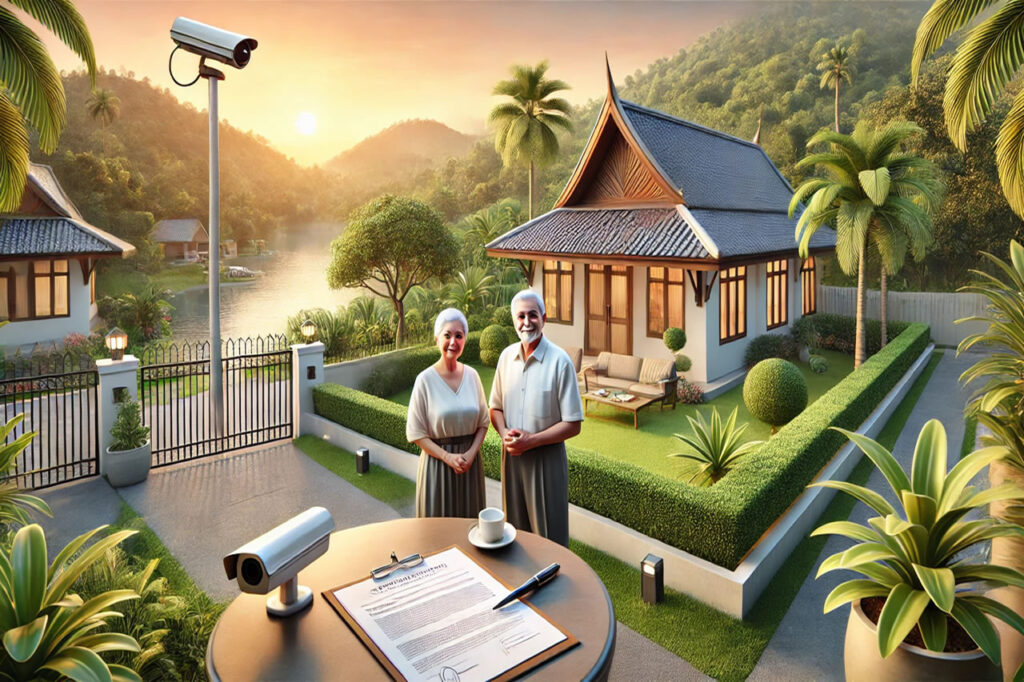
Common Scams – Staying Street Smart
While Thailand is notorious for its warm hospitality, scams do exist, especially in touristy areas. Retirees should be aware and cautious to avoid unnecessary financial losses.
Property & Rental Scams
- Always use reputable agents when buying or renting.
- Read contracts carefully and avoid landlords demanding excessive upfront deposits.
- Be cautious of foreigners offering “too good to be true” investment deals.
Dual Pricing & Overcharging
Some attractions, restaurants, and services charge higher prices for foreigners (farang price).
- Look for places that display official prices.
- If in doubt, ask locals about fair pricing before purchasing.
- Some national parks allow expats with Thai driver’s licenses or work permits to pay local prices.
Tuk-Tuk & Taxi Scams
Some drivers refuse to use meters or take passengers to overpriced souvenir shops for commissions.
- Always insist on metered taxis or use ride-hailing apps like Grab or Bolt.
- Avoid drivers who approach you at tourist hotspots – instead, hail taxis from the main road.
Gold & Jewelry Scams
Scammers may sell fake gems at inflated prices.
- Buy gold or jewelry only from reputable stores.
- Get a receipt and authentication certificate for any major purchase.
Driving in Thailand – Road Safety & License Requirements
Thailand’s roads can be chaotic, and traffic laws are not always enforced. Many retirees choose not to drive due to the risks, but if you do, ensure you’re licensed and insured.
License Requirements
- International Driving Permit (IDP) – If you plan to drive short-term, get an IDP from your home country before arriving.
- Thai Driver’s License – Required for long-term residents and available at the Department of Land Transport (DLT).
- Some car rental agencies may not recognize foreign licenses without an IDP.
➡️ Read my Guide ===> Getting a Thai Driver’s License: Process, Requirements, And Converting A Foreign License
Road Safety Tips
- Motorbikes Are Risky – Many expats get into motorbike accidents due to reckless drivers and lack of experience. If riding, always wear a helmet and avoid driving at night.
- Traffic Laws Are Often Ignored – Red lights, pedestrian crossings, and speed limits are sometimes disregarded. Stay alert and drive defensively.
- Police Checkpoints Are Common – Carry your passport, valid license, and insurance papers when driving.
Emergency Contacts – Who to Call in a Crisis
Knowing the right numbers to call in an emergency can make all the difference. Important Emergency Numbers in Thailand:
- Police – 📞 191
- Tourist Police (English-speaking assistance) – 📞 1155
- Ambulance & Medical Emergencies – 📞 1669
- Fire Department – 📞 199
- Bangkok Hospital Emergency Hotline – 📞 1719
- Bumrungrad International Hospital Emergency – 📞 +66 2 066 8888
Is Thailand the Right Retirement Destination for You?
I applaud you if you made it all the way here; that was a read and a half! That’s a lot of information to process and many different aspects to consider if Thailand is the right retirement destination for you.
Thailand surely has something to offer for every retiree, such as a low cost of living, friendly locals, great food, and top-quality healthcare. But retirement here isn’t just all about sunshine & rainbows – it requires planning, adapting to cultural differences, and staying on top of visa regulations and many more things.
So, is Thailand really the right place for you to retire? The best time to start planning is right now!!
📌 Found this content helpful?
If this helped you plan your retirement path, a coffee is a small thank-you that supports more in-depth retirement content.

Founder of Thrive in Thailand
Long-term expat living in Thailand—sharing culture, insights, and real-life farang wisdom, one story at a time!
💬 Thinking of retiring in Thailand? Drop a comment below with your questions or share your experiences!
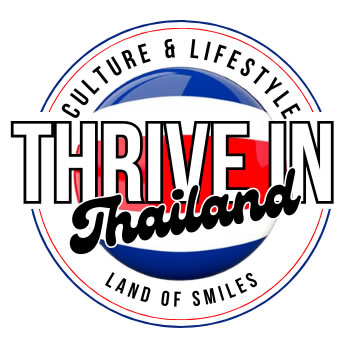
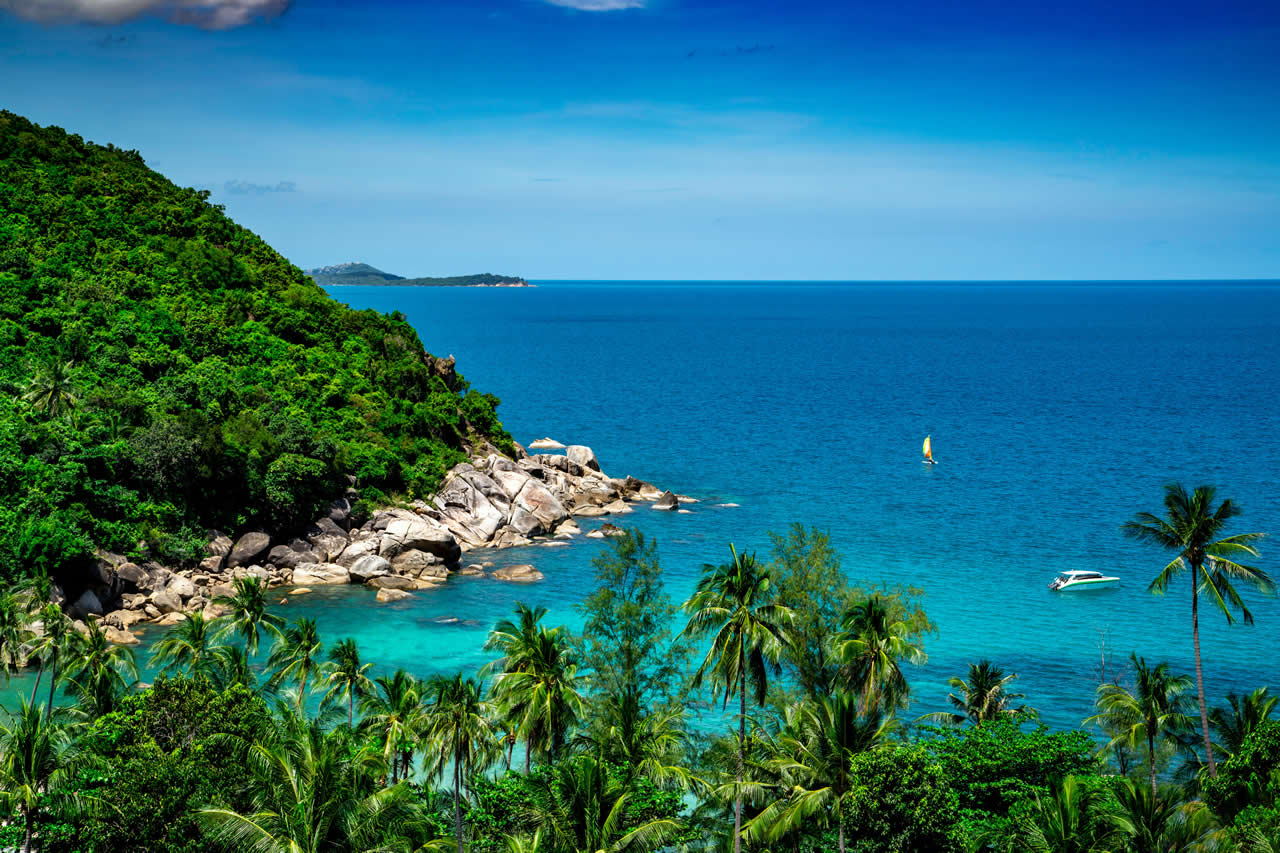
Thank you for going into such detail regarding options for retirees. You have been very thorough and has opened my eyes to some of the issues to look out for before moving to Thailand and some of the requirements. One question. For someone in the mid fifties, where would you recommend moving to? Also would you recommend renting before buying a condo?
Hi John, thank you for your feedback, much appreciated! I am glad you found the information useful. To your questions:
Where to move to?
Where to settle depends on your personal preferences as well as the available budget. There are many things to consider. Do you like beach living, city life, or maybe you prefer the countryside? In any case, I would recommend spending several months first at the place you choose before you commit. That gives you enough time to check out everything that is important to you, such as shopping, entertainment, medical care, the expat community, access to nature, and outdoor activities, to name a few.
Rent before buying?
I strongly advice against buying before renting! Rental properties in Thailand are very reasonable priced compare to the Western world and not too difficult to find (with the right information and some effort). If you buy right away and later down the road, find out you would prefer living somewhere else in Thailand, owning a property can be a drawback. Rent first for a while and if you are happy where you are you still can buy.
For information regarding renting read my guide: How to Rent a Condo or House in Thailand: Everything Expats Need to Know